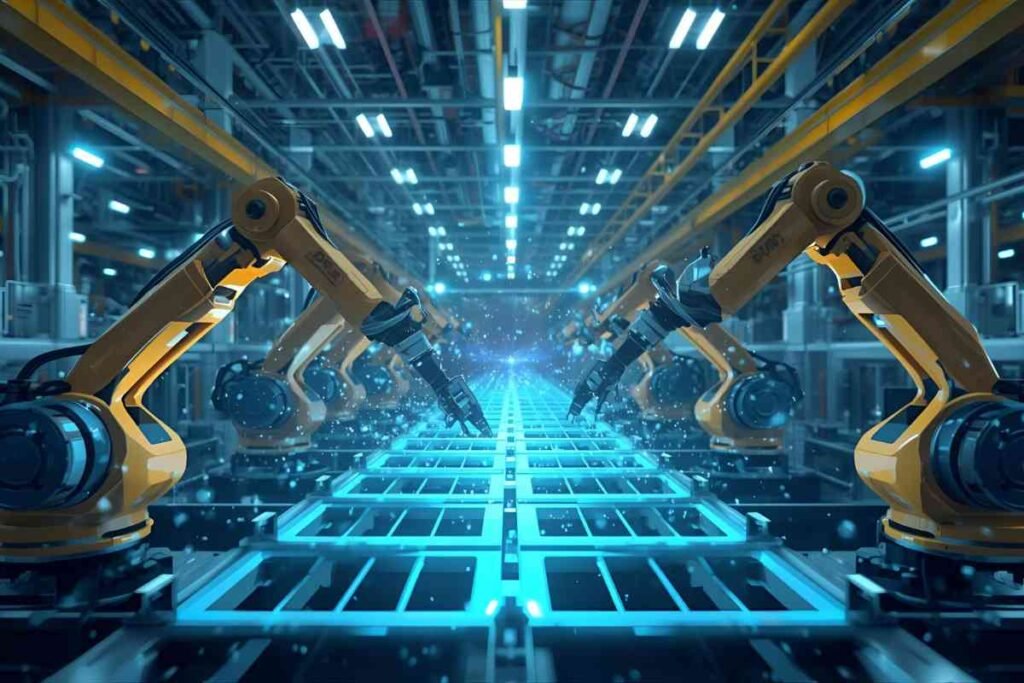New technology in computer science trends are shaping the way we work and live.From AI to quantum computing innovations are redefining modern possibilities.
These trends highlight the rapid evolution of computing tools and techniques.Developers researchers and businesses are constantly adapting to stay ahead.
Exploring these technologies can give you a competitive edge in your field.Dive in to discover how the latest breakthroughs are transforming our future.
Understanding New Technology in Computer Science

Computer science is no longer confined to traditional software development or hardware design. The new technology in computer science refers to advanced tools frameworks and methodologies that drive automation decision making and problem solving at an unprecedented scale.
This includes developments in artificial intelligence, machine learning cloud computing IoT cybersecurity and emerging paradigms like quantum and neuromorphic computing.
new technology in computer science are not only transforming businesses but also impacting education healthcare entertainment and social infrastructure.
As the world becomes increasingly digital staying informed about these advancements ensures that individuals and organizations remain competitive and adaptive.
The Role of Artificial Intelligence and Machine Learning
Artificial Intelligence AI and Machine Learning ML are revolutionizing the way we interact with technology.They enable machines to learn from data make decisions and improve performance over time.
From healthcare to finance AI and ML are driving smarter solutions and increasing efficiency.Understanding their role helps businesses and individuals leverage these technologies for innovation and growth.
Agentic AI and Multimodal Systems
Artificial intelligence AI and machine learning ML are at the forefront of the new technology in computer science. Agentic AI refers to autonomous systems capable of planning reasoning and executing tasks without constant human input.
Multimodal systems integrate text image and audio processing creating intelligent platforms that interact seamlessly with users.
These systems are increasingly used in healthcare for predictive diagnostics in finance for fraud detection and in customer service for chatbots and virtual assistants. Businesses that implement agentic AI benefit from improved efficiency personalization and intelligent automation.
AI at the Edge
Edge AI combines AI and edge computing enabling data processing near the source of generation. This technology is critical for real time applications like autonomous vehicles industrial automation and smart city infrastructure.
By minimizing latency and reducing bandwidth use edge AI ensures faster and more reliable decision making.Market analysts predict that the adoption of AI at the edge will expand rapidly particularly in industries that rely on real time data analytics including healthcare logistics and manufacturing.
Generative AI and On Device AI
Generative AI a subset of AI creates original content from pre existing datasets including text images and music. The rise of open source generative AI and on device AI makes these tools accessible to a wider range of developers and creators.
Businesses can now produce high quality content efficiently while consumers benefit from AI powered applications in daily life.
Cloud Computing and AI Driven Development
Cloud computing and AI driven development are revolutionizing the way applications are built and deployed.By combining scalable cloud infrastructure with intelligent AI tools businesses can innovate faster and deliver smarter solutions.
AI Native Development Tools
AI is revolutionizing software development through AI augmented development tools. new technology in computer science tools assist in coding testing debugging and optimization.
Platforms like Replit Agent and Cursor.sh help developers create applications faster improving code quality and reducing operational costs.
Vertical SaaS and Industry Specific Cloud Platforms
Vertical SaaS platforms are industry focused cloud solutions optimized with AI capabilities. Healthcare finance and retail industries benefit from customized cloud solutions that streamline workflows enhance compliance and provide tailored insights.
new technology in computer science platforms enable businesses to automate processes while maintaining operational efficiency.
Autonomous Applications and Super Apps
The concept of autonomous applications involves AI driven apps capable of optimizing themselves for better performance and user experience.
Super apps integrate multiple services into a single platform creating seamless ecosystems that enhance engagement and operational efficiency.
Emerging Communication Technologies
Emerging communication technologies are reshaping how people connect share information and collaborate across distances.
From 5G networks to advanced AI driven platforms new technology in computer science innovations are making communication faster smarter and more immersive.
5G Advanced and 6G Foundations
The advancement of 5G networks and foundational 6G research is a critical aspect of new technology in computer science.
Ultra fast connectivity low latency and high bandwidth are transforming industries such as IoT augmented reality autonomous transport and smart cities. The global 5G market is projected to reach nearly $800 billion by 2025 highlighting the rapid pace of adoption.
Internet of Things IoT and AIoT
IoT connects physical devices to collect and exchange data enabling smarter homes cities and industrial operations.
When integrated with AI these systems referred to as AIoT can predict maintenance needs optimize energy usage and improve operational efficiency. This convergence of technologies is reshaping sectors like manufacturing healthcare and transportation.
Quantum and Neuromorphic Computing
Quantum and neuromorphic computing represent the next generation of processing power designed to solve complex problems faster than traditional systems.
new technology in computer science mimic natural brain functions and leverage quantum mechanics opening the door to smarter more efficient computing solutions.
Quantum Computing
Quantum computing leverages qubits and quantum mechanics to solve complex problems beyond the reach of traditional computers. It holds immense potential in drug discovery cryptography optimization and material science.
Research and investment in quantum computing are accelerating with major players like IBM and Google advancing hardware and algorithms to bring this technology closer to practical application.
Neuromorphic Computing
Neuromorphic computing mimics the human brains neural architecture enabling machines to learn and adapt efficiently.
This new technology in computer science is energy efficient and capable of real time learning making it ideal for robotics autonomous systems and advanced AI applications.
While adoption is still in the early stages research institutions are pioneering breakthroughs that could transform computational efficiency.
Cybersecurity and Ethical AI
Cybersecurity and ethical AI work together to protect digital systems from evolving threats.They ensure that intelligent technologies operate safely responsibly and without harming users.
AI Driven Zero Trust and CTEM
As cyber threats evolve AI driven cybersecurity tools like continuous threat exposure management CTEM systems provide real time monitoring and proactive defense.
Zero trust architectures ensure strict access controls while AI enhances threat detection and response capabilities. These technologies are particularly critical for finance healthcare and government sectors.
AI TRiSM and Ethical Governance
AI TRiSM frameworks focus on building trust in AI by ensuring transparency mitigating bias and enhancing security.
Ethical governance of AI is essential for responsible deployment especially in sensitive domains such as healthcare and finance. Businesses adopting AI TRiSM gain credibility and regulatory compliance.
Biotechnology Sustainability and Human Augmentation
Biotechnology sustainability and human augmentation are driving major innovations that improve health environment and human capability.
new technology in computer science advancements are shaping a smarter cleaner and more efficient future where technology and biology work together for global progress.
Precision Fermentation and Gene-Edited Crops
Biotechnology is redefining agriculture through techniques like CRISPR gene editing and precision fermentation. These innovations increase crop yields improve resistance to environmental stress and enhance nutritional content addressing global food security and sustainability challenges.
Climate Tech and Carbon Aware Computing
Sustainable new technology in computer science is crucial in reducing the environmental impact of computing. Carbon aware computing green data centers and renewable energy solutions are gaining traction, enabling organizations to meet net zero goals while optimizing computational efficiency.
Neural Interfaces and Exosuits
Human augmentation through neural interfaces and wearable exosuits extends physical and cognitive capabilities. These technologies aid in mobility restoration enhance workforce productivity and offer novel healthcare solutions for individuals with disabilities.
Robotics Automation and Digital Twins

Robotics automation and digital twins are transforming industries by creating smarter faster and more accurate processes.
new technology in computer science work together to simulate monitor and optimize real world systems for improved performance and innovation.
Hyperautomation
Hyperautomation combines AI machine learning and robotic process automation RPA to streamline complex business processes.
From automating financial reconciliation to predictive maintenance in manufacturing hyperautomation enhances efficiency and reduces operational costs.
AI Copilots and Wearables
AI copilots integrated with wearable technology create augmented connected workforces. These systems provide real time insights improve communication and enhance safety particularly in remote or industrial work environments.
AI Powered Digital Twins
Digital twins replicate physical systems virtually enabling real time monitoring predictive maintenance and operational optimization.
Industries such as manufacturing construction and urban planning leverage digital twins to make data driven decisions and improve productivity.
Blockchain and Decentralized Systems
Blockchain and decentralized systems are revolutionizing how data is stored shared and protected.They provide unmatched transparency security and trust by removing the need for central authorities.
Enterprise Blockchain and Tokenization
Blockchain technology ensures secure transparent and immutable records for transactions and assets. It has applications in finance supply chain management and healthcare providing trust reducing fraud and enhancing traceability.
Regulated Deepfakes and AI Avatars
Synthetic media and AI generated content are transforming marketing entertainment and communication. Regulation and watermarking standards ensure ethical use while enabling creativity and automation through AI avatars and deepfakes.
Stay ahead in the digital era explore the latest new technology in computer science and transform your future today!
You can explore the articles below and get more helpful information directly from our website.
Adversarial search in artificial intelligence
ATFBORU: Advancing Autonomous Digital Systems
Conclusion
New technology in computer science is reshaping every aspect of our digital world from AI and quantum systems to blockchain and sustainable innovation.
These rapidly evolving tools empower businesses developers and individuals to create smarter faster and more secure solutions.As AI cloud computing IoT and next gen communication continue to advance they unlock new possibilities for automation connectivity and intelligence.
Staying informed and adaptable ensures you remain competitive in a future driven by continuous innovation and transformative breakthroughs.
FAQs
What is meant by new technology in computer science?
New technology in computer science refers to advanced tools, frameworks, and systems like AI, quantum computing, IoT, and cloud platforms. These innovations improve automation, decision-making, and problem-solving across industries.
How is artificial intelligence transforming modern industries?
Artificial intelligence enhances efficiency by enabling machines to learn, predict, and automate tasks. From healthcare to finance, AI supports better diagnostics, fraud detection, and customer service.
What is the role of edge AI in todays digital landscape?
Edge AI processes data closer to the source, reducing latency and improving decision speed. It’s essential for autonomous vehicles, industrial automation, and real-time smart city systems.
Why is quantum computing considered the future of computation?
Quantum computing uses qubits to solve problems too complex for classical computers. It holds huge potential in cryptography, drug discovery, and optimization tasks across industries.
How does AI driven cybersecurity protect organizations?
AI-powered cybersecurity tools detect threats in real time, analyze vulnerabilities, and automate defense responses. Zero trust architectures ensure strict access controls and higher protection levels.
What is the significance of vertical SaaS in business operations?
Vertical SaaS platforms offer industry-specific cloud solutions optimized with AI. They enhance workflow efficiency, compliance, and customer insights in sectors like healthcare, finance, and retail.
How are biotechnology and sustainability connected to modern computing?
Technologies like precision fermentation, gene editing, and carbon-aware computing support eco-friendly innovations. They help improve agriculture, reduce emissions, and optimize energy use in digital systems.
What makes blockchain important in modern digital systems?
Blockchain ensures secure, transparent, and tamper-proof data transactions. new technology in computer science benefits finance, supply chains, and healthcare by reducing fraud, increasing trust, and improving traceability.